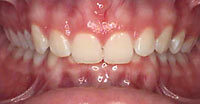 Dental Protrusion
Dental Protrusion
The upper teeth extend too far forward or the lower teeth do not extend far enough forward. Most often, this type of bite is caused by a thumb sucking or finger habit.
Overbite
 The upper front teeth extend out over the lower front teeth, sometimes causing the lower front teeth to bite into the roof of the mouth. Overbite is also known as a “deep bite”.
The upper front teeth extend out over the lower front teeth, sometimes causing the lower front teeth to bite into the roof of the mouth. Overbite is also known as a “deep bite”.
A “deep overbite” or deep bite occurs when the lower incisor (front) teeth bite too close or into the gum tissue behind the upper teeth possibly causing a tissue impinging deep bite. A deep bite can also contribute to excessive wear of the incisor teeth.
Crossbite
Crossbite is when the upper jaw is too narrow causing the lower jaw to either swing to one side to allow teeth to bite or causing both sides of the back teeth to bite outside of the top teeth instead of the inside. Crossbite should be treated because it can cause premature wear of the teeth, gum disease, dysfunctional chewing patterns and hinder proper development.
Open bite
Proper chewing is impacted by this type of bite, in which the upper and lower front  teeth do not overlap. Open bite may cause a number of unwanted habits, such as tongue thrusting.
teeth do not overlap. Open bite may cause a number of unwanted habits, such as tongue thrusting.
Crowding
gets worse over time as one tooth pushes over the other leading to overlapping teeth. Crowded teeth are harder to clean then straight teeth, which will lead to cavities and tooth decay. Crowding can often be corrected by expansion so as to avoid tooth removal.
Dental Midline Not Centered
This type of problem is caused when the back bite does not fit and match appropriately, which may negatively impact jaw and proper dental function.

